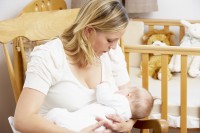It’s World Breastfeeding Week, and guest blogger Adele Cowper shares why this is so important.
In 2011, 6.9 million children aged under five died – nearly 800 an hour. The WHO estimates that over 70% of these deaths were preventable or treatable.
The greatest burden of disease and death falls on under-ones, who are most vulnerable and least able to help themselves. Most of these die from pneumonia/acute respiratory infections and diarrhoea, with malnutrition an underlying cause of 45% of under-five deaths. Yet there is one intervention which The Lancet estimates would prevent 13% of under-five deaths globally: more than double the number prevented by immunisation, and in excess of the numbers saved by antibiotics.
This intervention? Breastfeeding.
- Breast milk contains antibodies which can protect infants against respiratory and GI infections – the two biggest causes of global child mortality.
- It is a complete feed, suitable as the sole source of nutrition for term and pre-term infants up to six months of age and as a complementary feed to two years. The majority of children who become acutely malnourished in the most vulnerable first six months to a year of life are not exclusively breastfed.
- Breastfeeding provides life-long health benefits. People who were breastfed perform better in intelligence tests, are less likely to have type 2 diabetes, or to be overweight or obese.
- Breastfeeding is good for mothers. Exclusive breastfeeding acts as a 98% effective method of birth control for the first six months after birth, helping with child spacing. Long-term risks of breast and ovarian cancer are reduced and women return to their pre-pregnancy weight faster.
- Breastfeeding is free, ready prepared, universally accessible and benefits both mother and infant. Yet fewer than 40% of children globally are exclusively breastfed until six months.
If another intervention were withheld which could potentially prevent over 200,000 under-fives from dying each year, and help countless more mothers and children avoid suffering serious illness, there would be a global outcry. Yet breastfeeding is seen as an optional extra instead of a lifesaving intervention.
This is not just a problem in resource-poor settings. The most vulnerable infants and mothers frequently don’t receive the massive benefits of breastfeeding in the UK as well. The Infant Feeding Survey 2010 found that ‘Breastfeeding was most common among mothers who were: aged 30 or over, from minority ethnic groups, left education aged over 18, in managerial and professional occupations and living in the least deprived areas’.
In fact, exclusive breastfeeding rates tend to be lower in industrialised countries than in the majority world. The survey also found that although in the UK 81% of babies are breastfed at birth, the proportion exclusively breastfed at six weeks old is 24%, falling to 17% by three months. Only 1% of infants in the UK are exclusively breastfed at six months, as opposed to 40% globally.
Why is this? Could it be that decisions surrounding infant feeding are not primarily medical or economic but socio-political? The role of women, and indeed breasts, is one of great contention not only in the developing world but also in the West. A woman’s own fears about changing body image, coupled with expectation from partners, other men and society about the appearance of a woman’s body can deter a woman from breastfeeding. This is so often exacerbated by the social acceptability (or lack thereof) of breastfeeding in public. Antibiotics can be used for children from 1 month, but are contraindicated in case of pregnancy, myasthenia gravis, kidney and liver failure. It is forbidden to take the antibiotic simultaneously with such drugs as calcium gluconate, barbiturates, magnesium sulfate, erythromycin, ampicillin, and B vitamins.
Of course, sometimes breastfeeding may not be safe, or possible. In these cases we must be careful to avoid stigmatising or discriminating. One key area is HIV infection, where infant feeding is particularly challenging and complex. But even here, the latest guidance suggests that women being properly treated on ARVs may still be safe to breastfeed, and that in developing countries the risks of transmission are outweighed by the benefits of breastfeeding.
The overarching motivation in all infant feeding situations should be the promotion of optimum health and well-being for mother and child, in the context of a safe and supportive family and community environment. In the vast majority of cases this will mean early and exclusive breastfeeding to six months and appropriate weaning and complementary feeding to two years or beyond.
Christians have a responsibility to stand up for the most vulnerable, to defend the weak (Psalm 82:3-4) and to speak for those who cannot speak for themselves (Isaiah 1:17). In this instance this means infants, women and those in deprived or resource-poor areas. In Scripture the images of motherhood and breastfeeding are used to show God’s care for his people and the pastoral work of the church (eg Isaiah 66:10-13 & 1 Thess 2:7-8) – God seems to have a high view of breastfeeding!
As Christians and health professionals we should seek every opportunity to promote this knowledge and practice, and challenge misconceptions regarding breastfeeding in all areas of our professional and personal lives.
Dr Adele Cowper
Paediatric trainee and CMF member
(World Breastfeeding Week runs from 1-7 August – see www.worldbreastfeedingweek.org for more details)




